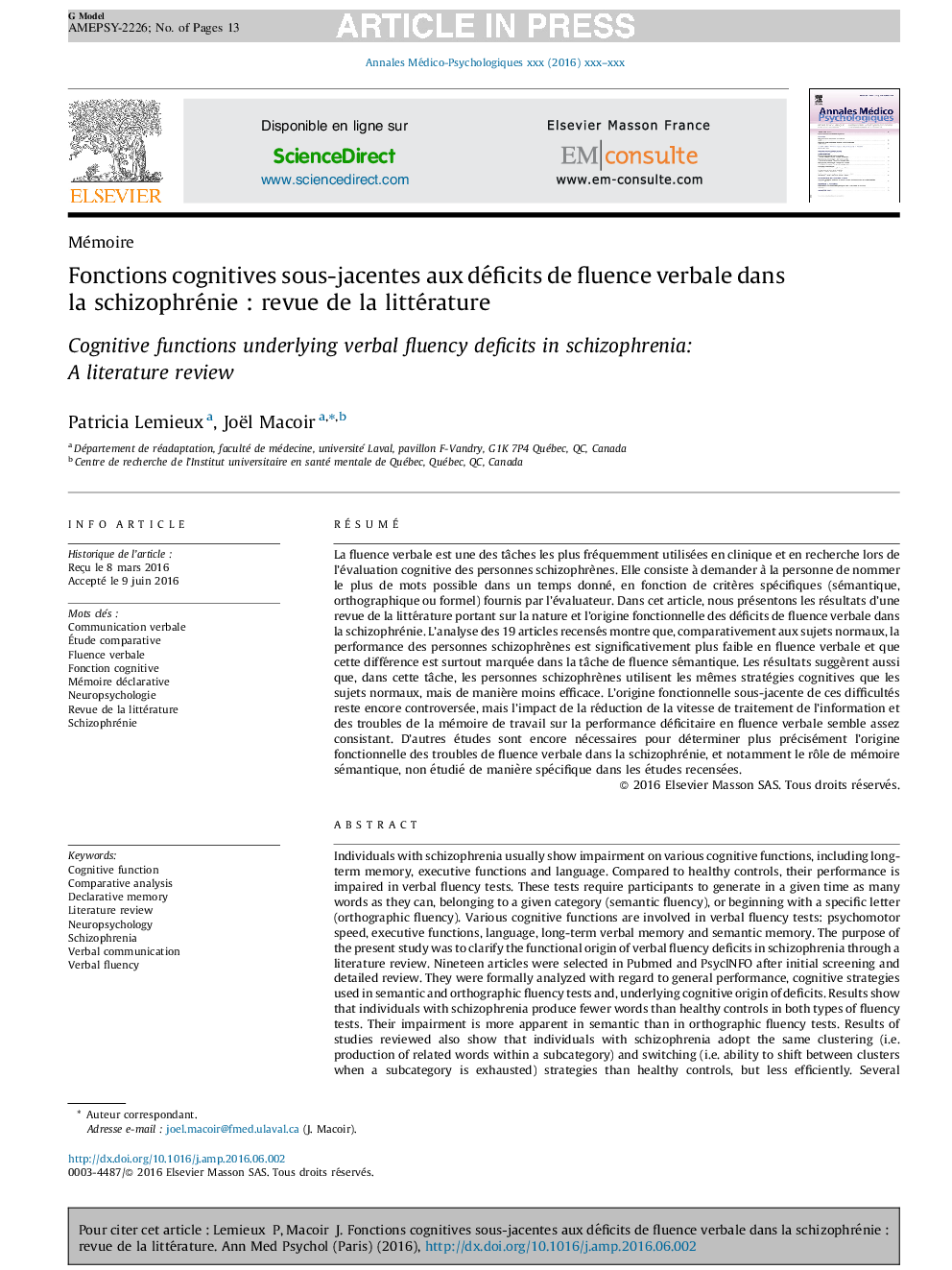| کد مقاله | کد نشریه | سال انتشار | مقاله انگلیسی | نسخه تمام متن |
|---|---|---|---|---|
| 6786103 | 1432381 | 2017 | 13 صفحه PDF | دانلود رایگان |
عنوان انگلیسی مقاله ISI
Fonctions cognitives sous-jacentes aux déficits de fluence verbale dans la schizophrénie : revue de la littérature
دانلود مقاله + سفارش ترجمه
دانلود مقاله ISI انگلیسی
رایگان برای ایرانیان
کلمات کلیدی
Communication verbaleverbal communication - ارتباط کلامیSchizophrenia - اسکیزوفرنی یا شیزوفرنیverbal fluency - تابعیت کلامیComparative analysis - تجزیه و تحلیل تطبیقیSchizophrénie - جنون جوانیDeclarative memory - حافظه اعلام شدهNeuropsychologie - عصب شناسیNeuropsychology - عصبروانشناسی یا نوروسایکولوژیCognitive function - عملکرد شناختیFonction cognitive - عملکرد شناختیRevue de la littérature - مرور ادبیاتÉtude comparative - مطالعه مقایسه ایLiterature review - پیشینه پژوهش
موضوعات مرتبط
علوم پزشکی و سلامت
پزشکی و دندانپزشکی
روانپزشکی و بهداشت روانی
پیش نمایش صفحه اول مقاله

چکیده انگلیسی
Individuals with schizophrenia usually show impairment on various cognitive functions, including long-term memory, executive functions and language. Compared to healthy controls, their performance is impaired in verbal fluency tests. These tests require participants to generate in a given time as many words as they can, belonging to a given category (semantic fluency), or beginning with a specific letter (orthographic fluency). Various cognitive functions are involved in verbal fluency tests: psychomotor speed, executive functions, language, long-term verbal memory and semantic memory. The purpose of the present study was to clarify the functional origin of verbal fluency deficits in schizophrenia through a literature review. Nineteen articles were selected in Pubmed and PsycINFO after initial screening and detailed review. They were formally analyzed with regard to general performance, cognitive strategies used in semantic and orthographic fluency tests and, underlying cognitive origin of deficits. Results show that individuals with schizophrenia produce fewer words than healthy controls in both types of fluency tests. Their impairment is more apparent in semantic than in orthographic fluency tests. Results of studies reviewed also show that individuals with schizophrenia adopt the same clustering (i.e. production of related words within a subcategory) and switching (i.e. ability to shift between clusters when a subcategory is exhausted) strategies than healthy controls, but less efficiently. Several hypotheses, such as the impairment of executive functions, semantic memory or speed of information processing, were put forward to account for this finding. Interestingly, the few studies in which researchers performed an analysis of the semantic relationships between words produced in fluency tests showed a less semantic coherence among people with schizophrenia than in healthy controls. Such a difference could be explained by disorganization of semantic memory or impairment in the activation of conceptual representations in semantic memory. Studies in which correlations and regression analyzes were performed allow for clarifying the cognitive origin underlying verbal fluency deficits in schizophrenia. The links between these deficits and information processing speed as well as working memory are well established. These two cognitive domains also appear to be strong predictors of performance in semantic and orthographic fluency tasks in schizophrenia. Individuals with schizophrenia usually present with a significant slowdown in the speed of information processing. Such a slowdown is likely to account for their poor performance in verbal fluency tests, which require the independent and rapid production of words. Working memory disorders are also core cognitive symptoms of schizophrenia. Working memory is involved in verbal fluency tests since they involve “strategic” activation of verbal information in long-term memory, inhibition of inappropriate words, switching between clusters, etc. However, the concept of working memory also partially encompasses the notion of executive functions so that the results reported in the present literature review, according to which impairment of verbal fluency in schizophrenia results from working memory deficits but not from executive functions deficits, are difficult to interpret. Results are also less clear-cut in regard to verbal long-term memory and to language abilities. Finally, numerous studies had shown that individuals with schizophrenia present specific deficits in the organization of semantic memory. However, the impact of this deficit on verbal fluency was explored in one study only. To conclude, verbal fluency tests are sensitive to various neurocognitive conditions and are helpful for differential diagnosis. Further studies are still needed to clarify the functional origin of verbal fluency deficits in schizophrenia, in particular the differential role of executive functions and working memory as well as the impact of semantic memory impairment.
ناشر
Database: Elsevier - ScienceDirect (ساینس دایرکت)
Journal: Annales Médico-psychologiques, revue psychiatrique - Volume 175, Issue 2, February 2017, Pages 127-139
Journal: Annales Médico-psychologiques, revue psychiatrique - Volume 175, Issue 2, February 2017, Pages 127-139
نویسندگان
Patricia Lemieux, Joël Macoir,